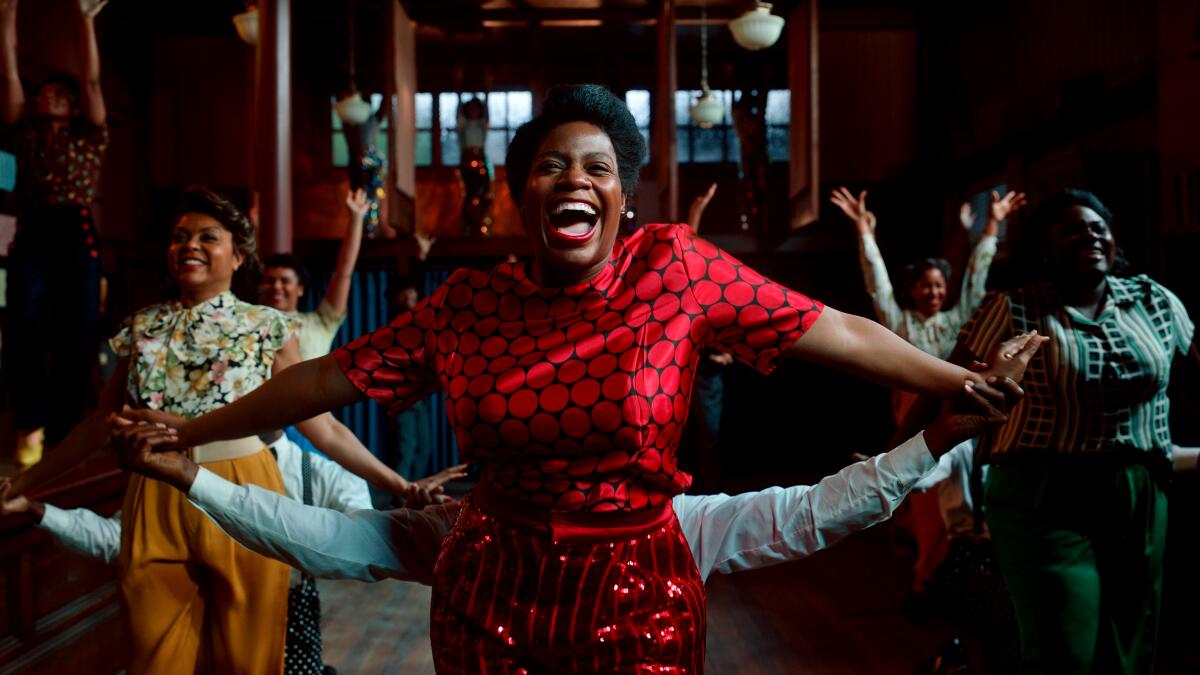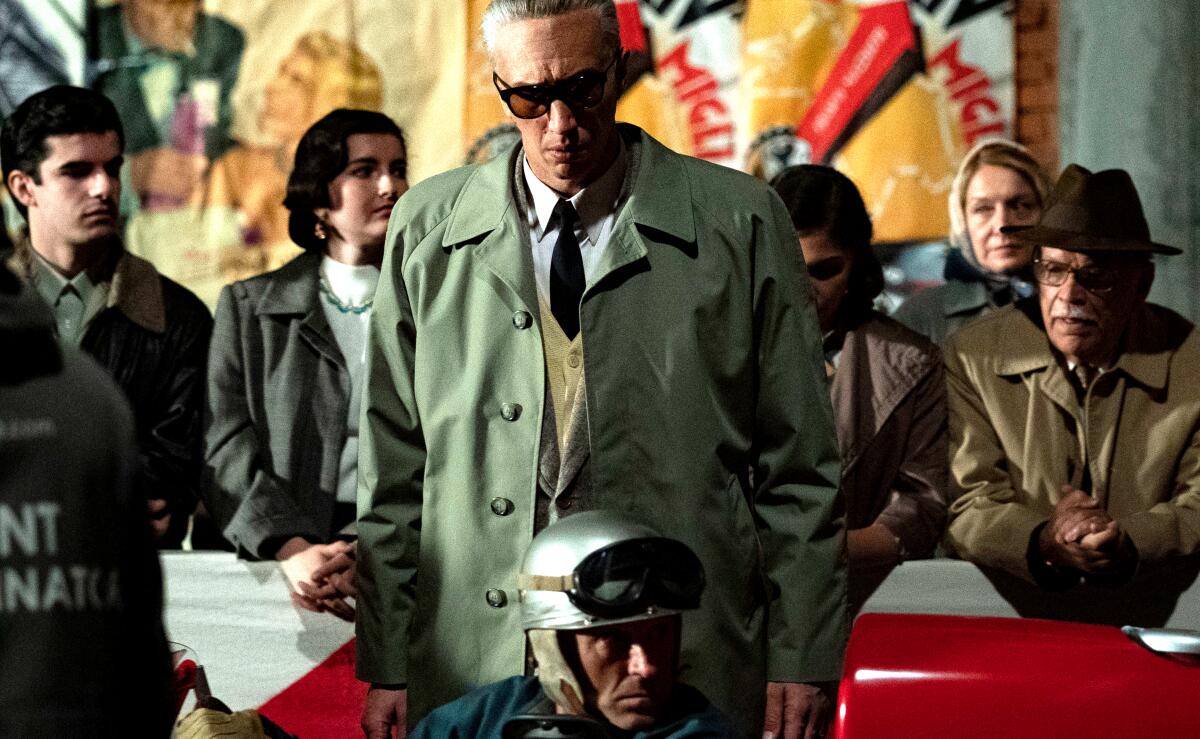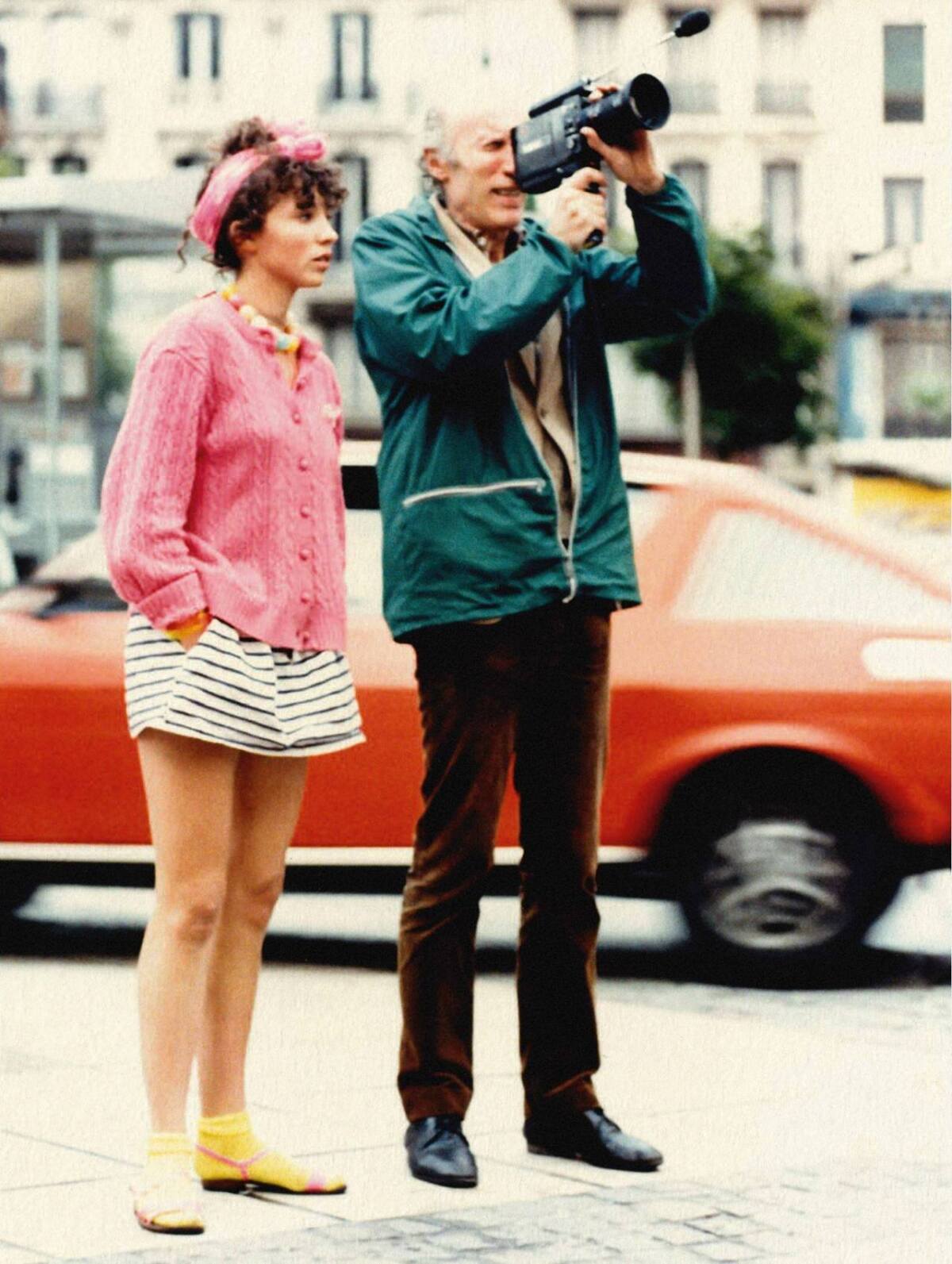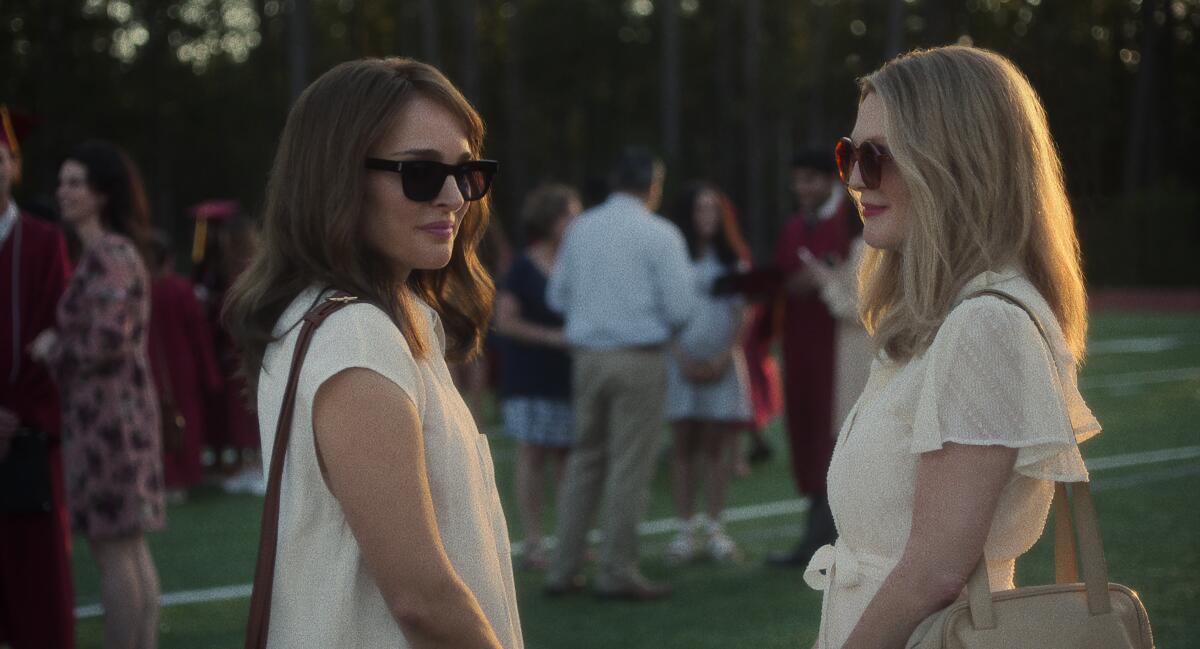Our holiday preview with ‘The Color Purple’ and the best movies playing this week in L.A.

- Share via
Hello! I’m Mark Olsen. Welcome to another edition of your regular field guide to a world of Only Good Movies.
For this year’s holiday preview, I spoke to Michael Mann about his new film “Ferrari,” a portrait of automaker Enzo Ferrari over a few eventful months in 1957. (I also talked to co-stars Adam Driver and Penélope Cruz, as well as Ferrari vice-chairman Piero Ferrari, Enzo’s son, who is depicted in the film as a child.) Mann is simply a great hang as an interview, leaping from why he wants his office near his house for impromptu late-night editing sessions, to the philosophy of auto racing, to the time Alberto Korda inscribed a portrait of Che Guevara to him.
If there is a certain kind of existential loner that is the ideal Mann protagonist — from “Thief” to “Heat” to “Ferrari” — Mann described it as, “I think I’m attracted to people who are struggling to do something, to accomplish something. And like all of us, I’m probably my own harshest critic, and I drive myself forward. I think characters who are conscious, are struggling to be conscious, are self-aware, want something, are pursuing something — they interest me.”

Tracy Brown wrote about the animated film “Wish,” directed by Chris Buck and Fawn Veerasunthorn and featuring the voices of Ariana DeBose and Chris Pine, and how its creators pulled from 100 years of history of Disney animation.
As Disney Animation’s chief creative officer Jennifer Lee put it in Tracy’s piece, “One of the things that was always important to Walt [Disney] was this idea of continuing to innovate as storytellers. Being able to create something completely original was a nod to the future.”
Ashley Lee checked in with director Blitz Bazawule about his forthcoming adaptation of the musical version of “The Color Purple,” starring Fantasia Barrino, Taraji P. Henson and Danielle Brooks.
Bazawule admitted to his own reservations on whether the material even needed to be brought to the screen again. But once he found a way into its lavish, elaborate visual language, with a series of storyboards and previsualizations, his own take became apparent. “Anyone who saw it immediately knew that, no, we are not making ‘The Color Purple’ that you think you know,” he said.
Rosette and Rohmer

Filmmaker Éric Rohmer, who died in 2010 at age 89, was well-known for his wry, dialogue-driven examinations of relationships in films that have been a continuing influence on the likes of Noah Baumbach, Richard Linklater and others. Along with being an Oscar-nominated filmmaker in his own right, Rohmer could also be a generous collaborator, as he was with Rosette, the monomonikered French actress who appears in his films “The Green Ray” and “Pauline at the Beach.” Rohmer pitched in as cinematographer on a series of short films through the 1980s and ’90s directed by Rosette, with his longtime editor Mary Stephen working on them as well.
Those films, screening as “The Adventures of Rosette (and Éric Rohmer),” will have their U.S. theatrical premiere at Mezzanine on Sunday, screening at 2220 Arts + Archives.
“I’m really delighted to show my films in Hollywood. (Or not so far),” Rosette said in an email, hinting at the cheeky humor of her own films by poking fun at the just-east-of-Hollywood location of the event.
On collaborating with Rohmer as her cameraman, Rosette said, “It was easy and pleasant because we were friends and the production was very light and economical.”
Though the impulse behind the first short films was initially to create a showcase for herself as a performer, everyone involved enjoyed the experience so much they decided to continue, ultimately making five films “with friends and actors of the Rohmer universe.” Sunday’s program of the four “Rosette” shorts also includes two later shorts introducing a new persona, Ninon.
The breezy, bawdy tone of the “Rosette” films may also have helped pushed Rohmer himself into the lighter direction of films such as 1987’s comedy “Four Adventures of Reinette and Mirabelle.”
Many of Rohmer’s films are now revered for their all-around hang-out vibes, and the same can be said of Rosette’s shorts. As she noted, “today, these shorts are a good testimony of the eighties and the ambiance of filming with Éric.”
‘May December’

The latest from director Todd Haynes is “May December,” which stars Julianne Moore as a woman once involved in a scandal and Natalie Portman as an actor who will be playing her in a movie. With Charles Melton as Moore’s much-younger husband, the film slides into a persona-swap story as both women find their sense of identity shaken up. The film is in theaters Friday and begins streaming on Netflix on Dec 1.
In his review for The Times, Justin Chang writes, “Their tetchy, tentative rapport evokes the dreamy, identity-blurring intimacy of Ingmar Bergman’s “Persona” and David Lynch’s “Mulholland Drive.” (A shot of Portman and Moore side by side, composed by cinematographer Christopher Blauvelt, makes the references hauntingly explicit.) And it’s hard to watch Moore here without thinking of the intensely vulnerable housewives she played in Haynes’ “Safe” and “Far From Heaven” (and also, perhaps, her career-launching work on “As the World Turns”).”
A screening Friday at the Aero with Haynes, Melton, Portman, Moore and screenwriter Samy Burch is already sold out, but there will be a stand-by line. Haynes will also introduce a Friday screening at the Nuart, where the film is playing in 35mm. The film will also play in 35mm at the New Beverly Cinema on Dec. 8, 9 and 10.
Other points of interest

‘Marie Antoinette’ Sofia Coppola’s 2006 film starring Kirsten Dunst was notoriously dismissed when it premiered at the 2006 Cannes Film Festival. With its bold use of modern pop music to bring vibrancy to a story set in 18th century France, the film has been reclaimed in subsequent years and is now seen by many as Coppola’s masterpiece for its examination of the expectations put upon young women, even royal ones. (The movie makes a fine parallel to Coppola’s new “Priscilla.”) Brain Dead Studios will be screening the film in 35mm on Sunday as part of their ongoing series “Desperately Seeking: Sofia Coppola in the New Millennium.” (Coppola’s 2010 film “Somewhere” will also screen on Sunday the 26th.)
Kenneth Turan asked the question way back in 2006, “Who owns history? And, more to the point, who owns Marie Antoinette?” Noting how in France in particular, Coppola’s film did not fit in with longstanding national narratives regarding Antoinette, he added, “In English-speaking countries, Coppola’s film has to some extent had to face a related bias, unhappiness that it doesn’t conform to a tyranny of expectations and preconceptions that the film isn’t weighty or serious enough in tone to take on such a fraught historical situation. Which was exactly the point.
Turan continued, “Speaking in Cannes before the film’s premiere, Coppola emphasized her determination to do a historical movie ‘in my style, to make it my own film, something I wanted to see. That was the most important thing, not to fall into the habits of generic period movies, not to get pushed into ‘This is how you should do it.’”
Terrence Malick’s ‘The New World’ Though the movie itself has been somewhat drowned by different versions in circulation, 2005‘s “The New World” staring Colin Farrell and Q’orianka Kilcher is an immersive telling of the story of John Smith and Pocahontas that pulls the viewer back into the rhythms of the past.
Reviewing the film in 2005, Carina Chocano wrote of Malick, “He uses sound and imagery to create a vast sensory universe unfiltered through received notions, current politics or moral judgments and historical hindsight. He doesn’t attempt to re-create a period so much as he tries to experience it for the first time, drawing human-scale characters against the enormous and cataclysmic backdrop of nature and history. What we get is not an “objective” or dispassionate view of the world but rather a series of subjective, experiential perspectives. He neither strives for verisimilitude nor spectacle but for an alchemic blend of both — life in all its power as it is experienced by sentient, sensitive beings.”
The American Cinematheque screens the film Wednesday in 35mm at the Los Feliz 3, as part of a series on colonization built around Nelson Pereira dos Santos’ 1971 film “How Tasty Was My Little Frenchman” and also including Michael Mann’s “The Last of the Mohicans,” Lucretia Martel’s “Zama” and Emilio Fernández and Alfredo Crevenna’s “Rebellion of the Hanged.”
‘Master and Commander’ and ‘Fargo’ at the Academy The museum will be screening Peter Weir’s 2003 seafaring epic “Master and Commander: The Far Side of the World” on Wednesday in 35mm in the David Geffen Theater. (It won two Oscars, for sound editing and cinematography.) This movie, starring Russell Crowe and Paul Bettany set aboard the HMS Surprise in the early 1800s, has been playing around town recently and has seen a resurgence in online fandom. Weir would make only one more movie after this before retiring; it’s the kind of large-scale filmmaking that has become rare in contemporary Hollywood.
In his original review of the film, Kenneth Turan wrote, “In the hands of Weir, his cast and production designer William Sandell, all this detail has an unmistakable cumulative impact. We really feel we’re on the Surprise; we struggle with the close quarters, the claustrophobia and the cabin fever just like the crew does, and that adds a level of intensity to the viewing experience.”
The Academy Museum is also screening the Coen Brothers’ “Fargo” on 35mm in the Geffen on Sunday. The film’s acclaim, winning Oscars for original screenplay and Frances McDormand’s performance as a pregnant small-town police chief, makes it an easy entry to take for granted in the Coens’ sprawling filmography, but it remains arguably the linchpin of their work.
You are reading Indie Focus newsletter
Sign up to get Mark Olsen's guide to movies and what’s going on in the wild world of cinema in your inbox every Friday
You may occasionally receive promotional content from the Los Angeles Times.
Only good movies
Get the Indie Focus newsletter, Mark Olsen's weekly guide to the world of cinema.
You may occasionally receive promotional content from the Los Angeles Times.




